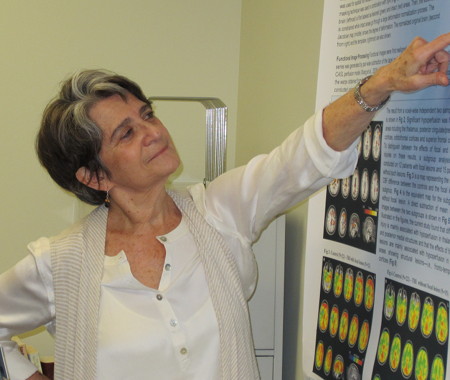
(Inside MossRehab Spring 2014) - Among the 750,000 Americans who have strokes each year, about 80,000 individuals experience aphasia, yet the study of aphasia treatment has a short history, spanning only the past several decades. Myrna Schwartz, PhD, associate director of the Moss Rehabilitation Research Institute (MRRI) and research professor of Rehabilitation Medicine at Thomas Jefferson University, is a national leader in aphasia research. Schwartz, who heads the Language and Aphasia lab at MRRI, which conducts basic and applied research on language processing impairments in stroke discusses her research and efforts to pioneer effective treatments for language disorders.
You were researching aphasia and acquired language disorders early in your career, in the 70s. What intrigued you?
My interest was, primarily, to understand how it is that brain damage from stroke or progressive dementia sometimes cleaves the normal language system ‘at its joints,’ impairing one component of the system while leaving others quite intact. In this vein, I published influential papers on dementia patients who had selective impairment of semantic (meaning-related) knowledge, and on patients with stroke aphasia who had intact grammatical competence in the face of very impaired grammatical performance.
What prompted you to join MossRehab?
I came to MossRehab in 1986 to study traumatic brain injury, under a fellowship from the National Institutes of Health. Working in a rehab setting allowed me to pursue my research on language disorders in greater depth, to study more and varied patients, and to interact with clinicians in an effort to devise more effective treatments.
You helped launch the Moss Rehabilitation Research Institute in 1992 and collaborated to pioneer therapies that have made a difference for many patients. What highlights come to mind?
My colleagues and I have pioneered the use of neural style models to explain, through simulation, how damage to different parts of the language system produces particular symptoms of aphasia. In parallel, my colleagues and I have developed new tests and procedures for diagnosing different symptoms of aphasia, including the Quantitative Production Analysis for assessment of grammatical disorders and the Philadelphia Naming Test for disorders of word retrieval.We developed new forms of treatment, such as Mapping Therapy for the treatment of disorders of sentence production. We have also pioneered computer-based language treatment, including the development of MossTalk Words® and the clinical evaluation of SentenceShaper®, developed by MRRI Adjunct Scientist, Marcia Linebarger.
What excites you about your current research and its potential to help patients with language enhancement after stroke?
New techniques for imaging details of the human brain in vivo continue to expand and alter older conceptions of how language is represented in the brain and the impact of neurological injury and disease. My lab is also engaged in collaborative research involving the use of electromagnetic stimulation of the brain to measure and possibly enhance the brain’s capacity to adaptively reorganize in response to stroke-related aphasia.
You have always been an advocate of collaborative research. What partnerships are you managing now?
I currently lead a team of researchers from University of Pennsylvania, Drexel University and University of Illinois in research that utilizes new imaging technology to precisely localize the brain lesions responsible for particular symptoms of aphasia. I am also very excited to be working with Erica Middleton, PhD, who recently joined the MRRI faculty, on research that brings learning theory into the aphasia clinic. This research addresses questions like: ‘Do patients learn from their speech errors, or are those errors stamped in through learning?’ Questions like that have serious implications for how we structure speech therapy in the clinic.
As research director of the MossRehab Aphasia Center, what current initiatives are a source of pride?
The Aphasia Center’s Advanced Clinical Therapy (ACT) program provides in-depth evaluation and treatment using protocols that are supported by research. This program pioneered the evidence-based approach that is now being promulgated in all aspects of clinical medicine.
Is there a career highlight of which you are especially proud?
One of my proudest achievements was and is the co-founding—with Ruth Fink and others— of the MossRehab Aphasia Center. While many around the country have followed our lead in creating venues that aim to meet the psycho-social and educational needs of families living with aphasia, few if any have managed to duplicate our Aphasia Center’s commitment to clinical-research integration.